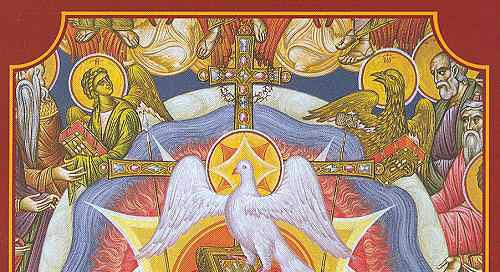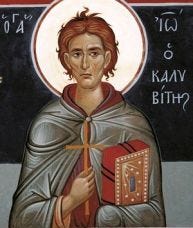"Created man cannot become a son of God and a god by grace through deification, unless he is first through his own free choice begotten in the Spirit by means of the self-loving and independent power dwelling naturally in him..”
St. Maximos the Confessor
Daily Scripture Readings
Hebrews 10:1-18
Brethren, since the law has but a shadow of the good things to come instead of the true form of these realities, it can never, by the same sacrifices which are continually offered year after year, make perfect those who draw near. Otherwise, would they not have ceased to be offered? If the worshipers had once been cleansed, they would no longer have any consciousness of sin. But in these sacrifices there is a reminder of sin year after year. For it is impossible that the blood of bulls and goats should take away sins. Consequently, when he came into the world, he said, “Sacrifices and offerings thou hast not desired, but a body hast thou prepared for me; in burnt offerings and sin offerings thou hast taken no pleasure. Then I said, ‘Lo, I have come to do thy will, O God,’ as it is written of me in the roll of the book.” When he said above, “Thou hast neither desired nor taken pleasure in sacrifices and offerings and burnt offerings and sin offerings” (these are offered according to the law), then he added, “Lo, I have come to do thy will.” He abolishes the first in order to establish the second. And by that will we have been sanctified through the offering of the body of Jesus Christ once for all. And every priest stands daily at his service, offering repeatedly the same sacrifices, which can never take away sins. But when this one had offered for all time a single sacrifice for sins, he sat down at the right hand of God, then to wait until his enemies should be made a stool for his feet. For by a single offering he has perfected for all time those who are sanctified. And the Holy Spirit also bears witness to us; for after saying, “This is the covenant that I will make with them after those days, says the Lord: I will put my laws on their hearts, and write them on their minds,” then he adds, “I will remember their sins and their misdeeds no more.” Where there is forgiveness of these, there is no longer any offering for sin.
Mark 8:30-34
A t that time, he charged them to tell no one about him. And he began to teach them that the Son of man must suffer many things, and be rejected by the elders and the chief priests and the scribes, and be killed, and after three days rise again. And he said this plainly. And Peter took him, and began to rebuke him. But turning and seeing his disciples, he rebuked Peter, and said, “Get behind me, Satan! For you are not on the side of God, but of men.” And he called to him the multitude with his disciples, and said to them, “If any man would come after me, let him deny himself and take up his cross and follow me.”
Venerable John Calabytes “the Hut-Dweller”
Saint John the Hut-Dweller was the son of rich and illustrious parents, and was born in Constantinople in the early fifth century. He received a fine education, and he mastered rhetoric and philosophy by the age of twelve. He also loved to read spiritual books. Perceiving the vanity of worldly life, he chose the path that was narrow and extremely difficult. Filled with longing to enter a monastery, he confided his intention to a passing monk. John made him promise to come back for him when he returned from his pilgrimage to Jerusalem, and take him to his monastery.
He asked his parents for a Gospel so that he might study the words of Christ. John’s parents hired a calligrapher to copy the text, and had the volume bound in a golden cover studded with gems. John read the Gospel constantly, delighting in the Savior’s words.
The monk kept his promise to come back for John, and they went secretly to Bithynia. At the monastery of the “Unsleeping” (Akoimitoi), he received monastic tonsure. The young monk began his ascetical labors with zeal, astonishing the brethren with his unceasing prayer, humble obedience, strict abstinence, and perseverance at work.
After six years, he began to undergo temptations. He remembered his parents, how much they loved him, and what sorrow he caused them. He regretted leaving them, and was filled with a burning desire to see them again.
Saint John explained his situation to the igumen Saint Marcellus (December 29) and he asked to be released from the monastery. He begged the igumen for his blessing and prayers to return home. He bid farewell to the brethren, hoping that by their prayers and with the help of God, he would both see his parents and overcome the snares of the devil. The igumen then blessed him for his journey.
Saint John returned to Constantinople, not to resume his former life of luxury, but dressed as a beggar, and unknown to anyone. He settled in a corner by the gates of his parents’ home. His father noticed the “pauper,” and began to send him food from his table, for the sake of Christ. John lived in a small hut for three years, oppressed and insulted by the servants, enduring cold and frost, unceasingly conversing with the Lord and the holy angels.
Before his death, the Lord appeared to the monk in a vision, revealing that the end of his sorrows was approaching, and that in three days he would be taken into the Heavenly Kingdom. Therefore, he asked the steward to give his mother a message to come to him, for he had something to say to her.
At first, she did not wish to go, but she was curious to know what this beggar had to say to her. Then he sent her another message, saying that he would die in three days. John thanked her for the charity he had received, and told her that God would reward her for it. He then made her promise to bury him beneath his hut, dressed in his rags. Only then did the saint give her his Gospel, which he always carried with him, saying, “May this console you in this life, and guide you to the next life.”
She showed the Gospel to her husband, saying that it was similar to the one they had given their son. He realized that it was, in fact, the very Gospel they had commissioned for John. They went back to the gates, intending to ask the pauper where he got the Gospel, and if he knew anything about their son. Unable to restrain himself any longer, he admitted that he was their child. With tears of joy they embraced him, weeping because he had endured privation for so long at the very gates of his parental home.
The saint died in the mid-fifth century, when he was not quite twenty-five years old. On the place of his burial the parents built a church, and beside it a hostel for strangers. When they died, they were buried in the church they had built.
In the twelfth century the head of the saint was taken by Crusaders to Besançon (in France), and other relics of the saint were taken to Rome.
Spiritual Wisdom from St. Nectarios of Aegina
Man
Man is a composite being, made up of an earthly body and celestial soul... The soul is closely united with the body, yet wholly independent of it.
Man is not only reason but also heart. The powers of these two centers, mutually assisting one another, render man perfect and teach him what he could never learn through reason alone. If reason teaches about the natural world, the heart teaches us about the supernatural world... Man is perfect when he has developed both his heart and his intellect. Now the heart is developed through revealed religion
This week’s calendar reminders:
Monday 1/14: Matins 8:30 am
Tuesday 1/15: no services or events
Wednesday 1/16: no services or events
Thursday 1/17: Matins 8:30 am
Friday 1/18: Matins 8:30 am
Saturday 1/19: Choir Practice 5 pm; Great Vespers 6 pm
Sunday 1/20: Divine Liturgy 9:15am










